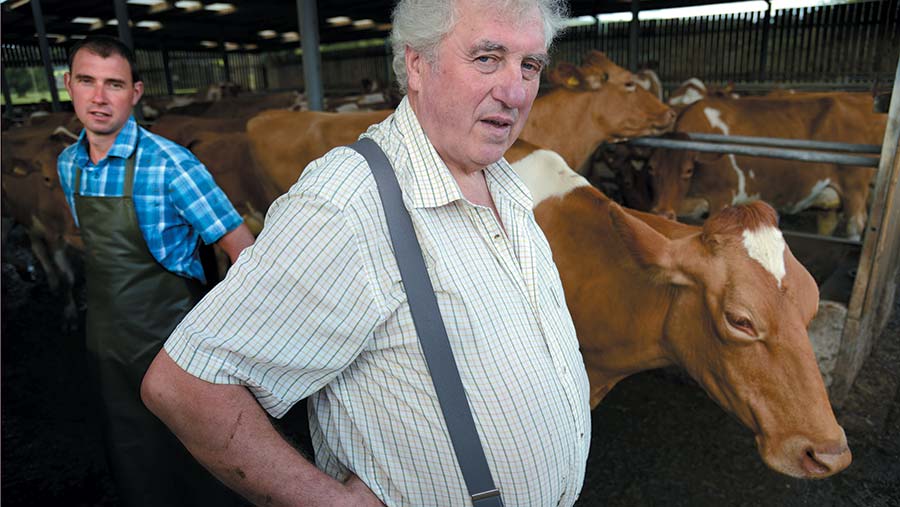Somerset dairy farmer’s TB hell featured in BBC documentary
 © Jimmy Edmonds Photography
© Jimmy Edmonds Photography A Somerset dairy farmer will tell thousands of TV viewers about the crippling effect TB is having on his dairy herd.
Maurice Durbin, 71, has been battling bovine TB at Bickfield Farm, in Compton Martin, Bristol, since 2010, where he has lost one-third of his 320-head Guernsey pedigree herd to the disease.
The current president of the English Guernsey Cattle Society, Mr Durbin will feature on Land of Hope and Glory, a three-part series documenting life in the British countryside, which starts at 9pm on BBC2 on Friday (4 March).
See also: Farmers’ groups submit 29 applications to cull badgers
The Bickfield herd of pedigree Guernseys graze the land between the Chew Valley and Blagdon Lakes, in the heart of the Mendip hills. Three generations of the Durbin family have farmed at Bickfield since the 1940s.
Viewers will hear how Bickfield Farm has lost 120 cows to TB since it was first struck down with the disease six years ago.
“It’s such a cruel disease, taking out your young cows,” Mr Durbin told Country Life magazine in a recent interview. “We’ve always enjoyed showing at agricultural shows, but all that had to stop.”
Since the farm was first hit with TB, it has restricted opportunities to take animals on the circuit. “To get them ready, they have to be broken to a halter and walked in the way a judge would like to see them. You get more attached to those ones that do all that work and bring back the trophies.”
However, the Durbin family was delighted to scoop Breed Champion and Reserve Breed Champion at last October’s South West Dairy Show.
TB testing ordeal
When Farmers Weekly contacted the family on Friday (4 March), Mr Durbin’s son Philip said the farm was in the middle of TB testing.
Philip, 39, who has taken on most of the work with his wife Gill at Bickfield, said: “We had another eight reactors yesterday. We are finishing testing today.
“We have been doing 60-day TB testing for a while. It is part of what we have to do. It is a pain in the backside, but it’s part of farming these days. You have to live with the consequences of it, or get out.”
Bickfield Farm is located outside the current pilot badger cull zones. The Durbin family farm a closed herd, apart from buying in breeding bulls, none of which have ever gone down with TB.
But they are convinced that infected badgers are the reason their herd has been hit by TB.
Philip said: “A lot of local neighbouring farms are in and out of TB, including some farms that have put up badger-proof fencing and barriers.
“We cannot manage the wildlife, but the research shows that badgers are a main factor in this disease.
“Our vet says that as little as 5ml of infected badger urine can carry tens of thousands infected spores that spreads the disease.
“If a badger urinates on the grass and a cow grazes it, or if one gets into the feed troughs, it can knock out a lot of animals in the one go.”
Getting the message across
Philip believes the farming industry is doing a “poor job” of getting the message across to the wider public about how badly TB is devastating UK herds.
“The average person will know that it costs thousands of pounds to vaccinate a badger. But how many will know that TB led to the slaughter of more than 30,000 cows in the UK last year?”
He said the government gassed badger setts in the 1970s, but since then successive governments had allowed TB to rampage across the countryside.
“The best way to get on top of this disease is to have a large cull of badgers. But our hands are tied as they are a protected species,” he added.
Public and scientific opinion split
Animal welfare groups said they hoped the programme would provide a balanced view of bovine TB and badgers.
Claire Bass, executive director of the Humane Society International UK, said: “It’s sad and frustrating to see badgers as scapegoats for a problem that fundamentally needs to be solved by overhauling farming practices.
“Reaching for the gun is a blunt and ineffective response that’s out of step with science, common sense and the views of many other farmers.
“The BBC for its part should be impartial, provide balance, and avoid presenting emotive opinion as fact. Regrettably it would appear that this programme will fall far short of that standard.”
Dominic Dyer, CEO of the Badger Trust, said: “You can never cover this issue without upsetting someone, but we do feel there needs to be both sides of the argument.
“Bovine TB and how we deal with it is a highly contentious issue. Public and scientific opinion is divided on this.
“We will be watching the programme and if it does not provides a balanced view we will be seeking a high-level meeting with the BBC’s editorial department.”
